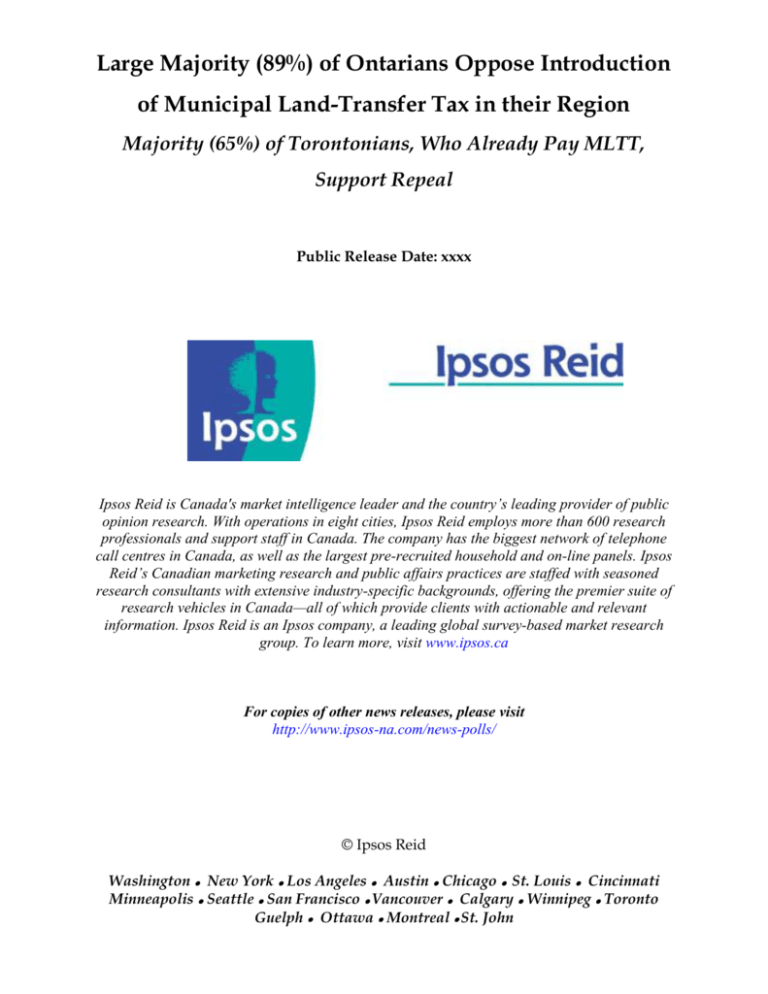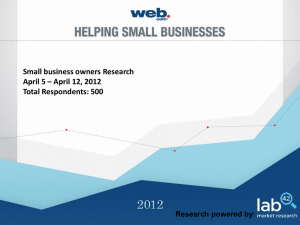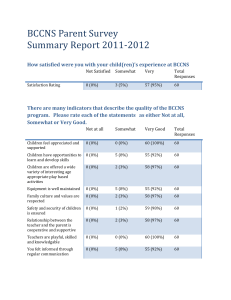of Ontarians Oppose Introduction of Municipal Land
advertisement

Large Majority (89%) of Ontarians Oppose Introduction of Municipal Land-Transfer Tax in their Region Majority (65%) of Torontonians, Who Already Pay MLTT, Support Repeal Public Release Date: xxxx Ipsos Reid is Canada's market intelligence leader and the country’s leading provider of public opinion research. With operations in eight cities, Ipsos Reid employs more than 600 research professionals and support staff in Canada. The company has the biggest network of telephone call centres in Canada, as well as the largest pre-recruited household and on-line panels. Ipsos Reid’s Canadian marketing research and public affairs practices are staffed with seasoned research consultants with extensive industry-specific backgrounds, offering the premier suite of research vehicles in Canada—all of which provide clients with actionable and relevant information. Ipsos Reid is an Ipsos company, a leading global survey-based market research group. To learn more, visit www.ipsos.ca For copies of other news releases, please visit http://www.ipsos-na.com/news-polls/ © Ipsos Reid Washington New York Los Angeles Austin Chicago St. Louis Cincinnati Minneapolis Seattle San Francisco Vancouver Calgary Winnipeg Toronto Guelph Ottawa Montreal St. John Large Majority (89%) of Ontarians Oppose Introduction of Municipal Land-Transfer Tax in their Region Majority (65%) of Torontonians, Who Already Pay MLTT, Support Repeal Toronto, ON – Most (89%) Ontarians who live outside of the City of Toronto who don’t already pay a municipal land transfer tax say they ‘oppose’ (69% strongly/20% somewhat) a new municipal land transfer tax charged for home buyers in their area, in addition to the current provincial land transfer tax. Just one in ten (11%) ‘support’ (2% strongly/9% somewhat) such a tax in their area. Support for new MLTTs outside of Toronto has held steady since last year. The Ontario government is considering giving municipalities the power to require home buyers to pay a municipal land transfer tax. Currently, home buyers in Ontario are only required to pay a provincial land transfer tax. For the buyer of an average priced home in Ontario, the provincial land transfer tax amounts to about $4,525 payable in full when a home is purchased. If the new municipal land transfer tax law is implemented, the overall land transfer tax will effectively double. Toronto is currently the only municipality in the province where a land transfer tax is implemented. Home buyers in Toronto are required to pay a municipal land transfer tax in addition to the provincial tax. The poll reveals that a majority (65%) of Torontonians ‘support’ (38% strongly/27% somewhat) ‘repealing the municipal land transfer tax in Toronto’, while one in three (35%) residents ‘oppose’ (19% strongly/17% somewhat) © Ipsos Reid -1Washington New York Los Angeles Austin Chicago St. Louis Cincinnati Minneapolis Seattle San Francisco Vancouver Calgary Winnipeg Toronto Guelph Ottawa Montreal St. John repealing the tax. In 2014, 54% of Torontonians supported a repeal, suggesting support for a repeal is climbing. Repealing the tax likely means that the City would need to search for new tools to replace the lost revenue. Among those who support a repeal, thinking about ways the City could raise funds instead, a tax on tobacco is the leading candidate (44%), followed by a tax on alcohol (27%), development charges (25%), road tolls (19%), a hotel room tax (13%), vehicle registration tax (11%), gasoline tax (10%), income tax (6%) or sales tax (3%). One quarter (22%) believes the City shouldn’t introduce any new taxes to raise funds instead of the MLTT, while one in ten (10%) doesn’t know. The existence of a municipal land transfer tax appears to have a tangible impact on the attitudes and behaviours of Ontarians. A majority says the existence of an MLTT in their area would likely… Make them spend less on renovations, furniture or appliances for the home they purchase – 81% likely (40% very/41% somewhat), up 8 points vs. 19% unlikely (6% not at all/13% somewhat) Impact their decision to move within that municipality – 81% likely (46% very/35% somewhat), up 9 points vs. 19% unlikely (6% not at all/13% somewhat) Make them more likely to consider buying a home in a municipality that doesn’t charge a municipal land transfer tax – 80% likely (48% very/33% somewhat), up 6 points vs. 20% unlikely (6% not at all/14% somewhat) Limit their ability to afford the home purchase – 77% likely (41% very/36% somewhat), up 8 points vs. 23% unlikely (6% not at all/17% somewhat) © Ipsos Reid -2Washington New York Los Angeles Austin Chicago St. Louis Cincinnati Minneapolis Seattle San Francisco Vancouver Calgary Winnipeg Toronto Guelph Ottawa Montreal St. John Make them incur more debt in order to pay the tax – 75% likely (41% very/34% somewhat), up 6 points vs. 25% unlikely (8% not at all/16% somewhat) Delay their decision to purchase a home – 75% likely (39% very/36% somewhat), up 4 points vs. 25% unlikely (7% not at all/17% somewhat) In fact, if homebuyers didn’t need to pay the tax, a majority (56%) says they would put the money towards their down-payment instead. Others would use the money to pay down debt (40%), use it for renovations or upgrades (39%), save it for their retirement or long-term savings (29%), buy appliances for their home (21%), buy furniture for their home (21%), save it for their kids’ education (15%), take a vacation (8%) or spend it in some other way (2%). One in ten (7%) doesn’t know how they’d spend this money instead of on the MLTT. Ontarians are emphatic in their views on a municipal land-transfer tax. Six in ten strongly agree that a municipal land transfer tax would make home ownership less affordable (59%, up 5 points), that they’d rather live in a municipality that didn’t charge a municipal land transfer tax (60%, up 3 points), and that this type of tax is an unfair tax on home owners (60%, down 1 point). Moreover, homeowners are already feeling squeezed. Two in three (67%, up 2 points) strongly agree that they’re tired of additional taxes on homeowners, and 63% strongly agree that homeowners pay too many taxes already (up 1 point). Distaste for new taxes is intuitive. But given the choice, most (62%) Ontarians strongly agree that municipalities should be looking at revenue tools other than municipal land transfer taxes, or for ways to reduce costs and save money rather than increasing taxes (65%). © Ipsos Reid -3Washington New York Los Angeles Austin Chicago St. Louis Cincinnati Minneapolis Seattle San Francisco Vancouver Calgary Winnipeg Toronto Guelph Ottawa Montreal St. John Further, a new tax on homeowners appears to fly in the face of the notion that most (77%) Ontarians ‘agree’ (36% strongly/41% somewhat) that ‘the government should do all it can to help Ontarians own their homes’, while one quarter (23%) ‘disagrees’ (4% strongly/20% somewhat) with this position. On balance, slightly more Ontarians say they’re in a worse (28%) position than a better position (26%) to buy a home now compared to three years ago. If the government is not to help, it almost certainly shouldn’t hurt: most (85%) ‘agree’ (45% strongly/40% somewhat) that ‘the government should avoid making it harder to own a home’, while just 15% ‘disagree’ (3% strongly/11% somewhat). In fact, seven in ten (70%) see land transfer taxes as a ‘barrier’ (31% major/39% moderate) to buying a home (up 13 points), while 24% see it as a minor barrier, and 6% don’t see it as a barrier at all. Ontarians appear likely to make their voice heard on this issue with their votes. Seven in ten (70%) Ontarians say they’d be less likely (41% much less/28% somewhat less) to vote for a politician who supports a municipal land-transfer tax, up 9 points. Two in ten (20%) say it has no impact on their vote (down 10 points), while one in ten (10%) are more likely (4% much more/6% somewhat more) to support such a candidate, up 1 point. Interestingly, the issue transcends political stripes, with a majority of PC (74%), NDP (72%) and Liberal (63%) voters saying they would be less likely to vote for a candidate who supports a municipal land transfer tax. These are some of the findings of an Ipsos Reid poll conducted between August 28 to September 8, 2015, on behalf of the Ontario Real Estate Association. For this survey, a sample of 1,501 Ontarians from Ipsos' Canadian online panel was interviewed online. Weighting was then employed to balance demographics to ensure that the sample's composition reflects that of the adult population according to Census data and to provide results intended to approximate the sample universe. The precision of © Ipsos Reid -4Washington New York Los Angeles Austin Chicago St. Louis Cincinnati Minneapolis Seattle San Francisco Vancouver Calgary Winnipeg Toronto Guelph Ottawa Montreal St. John Ipsos online polls is measured using a credibility interval. In this case, the poll is accurate to within +/-2.9 percentage points of what the results would be had all adults in Ontario been surveyed. -30For more information on this news release, please contact: Sean Simpson Vice President Ipsos Reid Public Affairs (416) 572-4474 For full tabular results, please visit our website at www.ipsos.ca. News Releases are available at: http://www.ipsos-na.com/news/ © Ipsos Reid -5Washington New York Los Angeles Austin Chicago St. Louis Cincinnati Minneapolis Seattle San Francisco Vancouver Calgary Winnipeg Toronto Guelph Ottawa Montreal St. John







